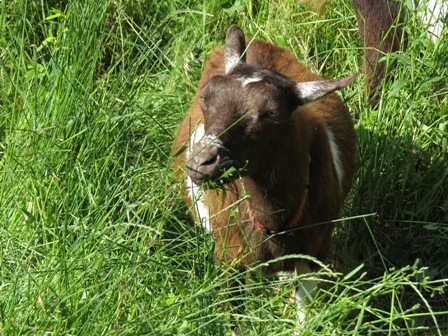 Meadows are wonderful. They are idyllic places that conjure images of rolling hills and children running barefoot. These beautiful open spaces are also home to many important species. From the grasses and wildflowers, to the insects and grassland birds, what’s not to love about meadows?
Meadows are wonderful. They are idyllic places that conjure images of rolling hills and children running barefoot. These beautiful open spaces are also home to many important species. From the grasses and wildflowers, to the insects and grassland birds, what’s not to love about meadows?
As with most things in nature, meadows are not permanent fixtures on the landscape. In fact, it takes a lot of work to maintain meadows as open space. The natural processes of succession are constantly working to turn meadows back into forests. Early-successional tree seedlings can’t resist trying to plant themselves in the abundant sunshine of meadows. Therefore, meadows must be actively managed to prevent trees from establishing and reverting the ecosystem back to forest.
Maintaining Meadows
Controlled wildfires are a natural way of maintaining open space in a predominantly forested landscape. However, due to the density of human settlement in Massachusetts, controlled burns are not popular management options.
If you have a lot of time, or a lot of volunteers, you can manually manage your meadow by pulling or cutting all of the woody growth as it pops up. Clearly this approach is best for small meadows, but it’s relatively inexpensive and a nice way to get to know your land really well.
Most land managers have turned to modern technology to help them keep their meadows open. Tractors pulling mowers are the most efficient means of keeping the woody growth at bay. Generally, you only need to mow once per year to knock back the seedlings that have begun to establish. Of course, it’s best to wait until August before mowing to allow the grassland nesting bird’s time to fledge. But mowing is a hot, loud, smelly job that requires a lot of expensive equipment and fuel.
Alas! There is Another Alternative
With their friendly demeanor and voracious appetites, goats are the perfect herbivore to help keep a meadow open. They gladly munch on woody growth, as well as non-native invasive species and poison ivy. For the past four summers, Habitat Wildlife Sanctuary in Belmont has been using goats to help manage its meadows with great success.
Not only are the goats adorable and a huge attraction for visitors, but they work hard. While they do require management and care, it’s a lot easier and cheaper to keep healthy goats then it is to keep a tractor in good working order.
Visit Habitat to meet the goats and see firsthand how well they are doing maintaining the meadows. It’s striking to see the contrast between where the goats have and have not browsed. And it’s great fun to watch them work…munching, munching, munching away.


